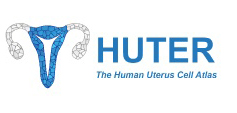HUTER
Human Uterus Cell Atlas
The human uterus is a flagship human organ with profound implications not only in reproduction but also in women’s health. For better understanding of the human health as well as improving the diagnosis, monitoring and treatment of uterine related diseases, greater knowledge is needed of the diverse cells found within this female organ.
The Human Uterus Cell Atlas (HUTER) project aims to perform unprecedented characterisation of the human uterus at single-cell resolution and to create the first reference molecular and spatial map of this important female organ, not only throughout the menstrual cycle but also across lifespan. The characterization at transcriptomic, genomic and spatial changes of this important female organ HUTER can advance the Human Cell Atlas initiative for the exploitation potential in Obstetrics and Gynaecology and biomedicine research areas such as Regenerative Medicine or Reproductive Medicine.
The uterus is itself a model for regenerative medicine since (i) endometrial tissue regenerates monthly and its transformation is executed through dynamic changes in states and interactions of multiple cell types, and (ii) myometrial tissue has remarkable regenerative capacity and extensive remodelling throughout pregnancy. Hence, the primary motivation for the HUTER consortia stems from the need to better understand the human uterus in order to more effectively address uterine diseases that impact women’s health such as myomas or endometriosis and/or might contribute to infertility, infant and maternal mortality and morbidity.
HUTER technological and biological platform will be a crucial resource for the scientific and clinical communities to define the cellular basis of health and disease, allowing the rapid development of new diagnosis and prognosis tools and therapeutic advancements in the field.
The European consortium
The HUTER consortium is made up of six organisations from four European countries. Partners’ entities are INCLIVA and BAHIA Software from Spain, Genome Research Limited and University of East Anglia from United Kingdom, UPPSALA University from Sweden, and Tervisetehnoloogiate Arenduskeskus AS from Estonia. The HUTER consortia is coordinated by INCLIVA.
INCLIVA’s role
INCLIVA’s coordination activities are extended towards the coordination with the international Human Cell Atlas initiative (HCA) and the regulatory and ethics compliance, management, communication and dissemination tasks. In addition, from the scientific perspective, INCLIVA leads the collection of whole uterus from healthy deceased donors through collaboration with hospitals and the National Transplant Organization (ONT) and endometrial tissue samples from healthy woman and with preeclampsia. The Reproductive Medicine Group led by Prof. Simon performs the molecular characterization at single cell resolution of both uterine tissues, endometrium and myometrium, using the most innovative and recent developments in single cell technologies, analytical methods and computational tools thanks to its multidisciplinary team of researchers.
Funding

HUTER has received funding from the European Union’s Horizon 2020 research and innovation programme under the grant agreement No 874867.
PROGRAMME
H2020 Health
PRINCIPAL INVESTIGATOR
ROLE
Coordinator
FUNDING
1.138.435,00 €
START/END
2020-2021

